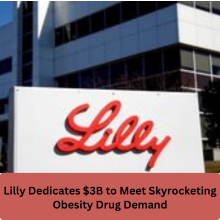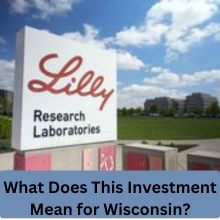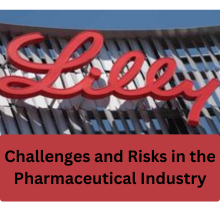
Eli Lilly, one of the leading pharmaceutical companies in the world, is making waves with a massive $3 billion investment in its Wisconsin manufacturing plant. This move comes at a time when demand for obesity and diabetes medications is at an all-time high. The company is expanding its Pleasant Prairie facility, which it acquired earlier this year from Nexus Pharmaceuticals. This step is part of Lilly’s effort to ramp up production of its popular weight-loss drug, Zepbound, and its diabetes treatment, Mounjaro, in response to soaring demand. Let’s dive into the details of this groundbreaking investment and what it means for both the company and the wider pharmaceutical industry.
Background on Eli Lilly and the Growing Demand for Obesity Medications
Eli Lilly, founded in 1876, is known for its innovative pharmaceutical solutions, especially in the areas of diabetes care, cancer treatments, and mental health. Recently, the company has gained significant attention for its contributions to the obesity crisis, particularly through its groundbreaking drugs Zepbound and Mounjaro. Zepbound, a new weight-loss medication, has become incredibly popular since its launch in 2023, with over 5.2 million prescriptions written. Mounjaro, a drug for diabetes management, also shares the same active ingredient, tirzepatide, which has proven effective in both reducing body weight and managing blood sugar levels.
The demand for these medications has surged due to the growing obesity epidemic, particularly in the United States, where nearly 40% of adults are considered obese. The need for effective, safe, and accessible treatments has never been more urgent. Eli Lilly has seized this opportunity, and its recent $3 billion investment reflects its commitment to meeting this demand head-on.
Why the $3 Billion Investment in Wisconsin?
The decision to invest in the Pleasant Prairie facility is not just about increasing production; it’s about ensuring that Lilly can scale its operations to meet future demand. The company acquired the plant from Nexus Pharmaceuticals earlier this year and has already begun working on plans to expand its manufacturing capacity.
This $3 billion investment will significantly boost the plant’s ability to produce Zepbound, Mounjaro, and other critical drugs. As Edgardo Hernandez, Lilly’s president of global manufacturing, pointed out, this move is one of their largest manufacturing investments outside of Indiana, the company’s home state. The expansion is designed to help Lilly meet the growing demand for its products while also positioning the company for future success in the competitive pharmaceutical landscape.
The Role of Zepbound and Mounjaro in Lilly’s Expansion
Zepbound and Mounjaro are both based on tirzepatide, a novel peptide that has shown remarkable results in clinical trials for weight loss and blood sugar control. Zepbound, in particular, has generated massive interest, with millions of prescriptions already written. Both drugs are considered groundbreaking in their ability to address the dual issues of obesity and diabetes, and their popularity shows no sign of slowing down.
However, with great success comes the challenge of meeting demand. For much of 2023, both Zepbound and Mounjaro were in short supply in the U.S. This was partly due to production limitations, which is why Lilly’s $3 billion investment is so critical. The expansion of the Wisconsin plant will allow the company to ramp up production and reduce the risk of future shortages.
Manufacturing Challenges and Solutions
Lilly faced significant manufacturing bottlenecks in 2023, with both Zepbound and Mounjaro in short supply. These challenges were partly due to the complexity of producing tirzepatide at scale. Lilly has responded by investing in new technologies and expanding its facilities to ensure that it can keep up with demand.
The new investment in Wisconsin will help alleviate these challenges by introducing more advanced production techniques and streamlining processes. This will not only increase output but also improve the consistency and quality of the drugs, ensuring that patients receive safe and effective treatments.
What Does This Investment Mean for Wisconsin?
Lilly’s $3 billion investment will have a significant impact on Wisconsin, both economically and socially. The expansion of the Pleasant Prairie plant will create 750 new jobs, adding to the 100 employees already working at the site. These jobs will include positions for operators, technicians, engineers, and scientists, contributing to the state’s growing pharmaceutical sector.
The investment will also have a broader economic impact, benefiting local businesses and infrastructure. Wisconsin’s strategic location and skilled workforce make it an ideal hub for pharmaceutical manufacturing, and Lilly’s expansion will only strengthen the state’s position as a key player in the industry.
The Global Pharmaceutical Manufacturing Race
Lilly’s investment is part of a larger trend among pharmaceutical companies to ramp up production capacity in response to increasing demand for obesity and diabetes medications. Competing with companies like Novo Nordisk, which has also invested billions in expanding its manufacturing capacity, Lilly’s move is a strategic one to ensure it can maintain its leadership in the market.
The race to meet global demand for weight-loss and diabetes drugs is intensifying, and companies like Lilly are focusing heavily on scaling their production capacity to avoid shortages and maximize profitability.
Also read: Tesla Lawyers’ $5.6B Fee Demand Rejected – Here’s Why
The Economic Impact of Expanding the Wisconsin Plant
Lilly’s investment in Wisconsin will provide a significant boost to the state’s economy. The new jobs created by the plant’s expansion will not only provide employment opportunities but will also contribute to the local economy through taxes and spending. Additionally, the expansion will likely lead to increased demand for local services and suppliers, further strengthening the state’s economic base.
Lilly’s $4 billion total investment in the plant, which includes the acquisition of additional land and a warehouse, is a clear sign of the company’s commitment to both the local community and its long-term growth strategy.
Challenges and Risks in the Pharmaceutical Industry
While the investment in Wisconsin is a major step forward for Lilly, the pharmaceutical industry faces several challenges. Regulatory hurdles, including the approval of new drugs and ongoing FDA oversight, can slow down production and limit growth. Additionally, managing the supply chain and ensuring consistent quality across large-scale manufacturing operations can be difficult.
Lilly must also contend with competition from other pharmaceutical giants, as companies like Novo Nordisk are also expanding their production capacity for weight-loss and diabetes medications.
FDA’s Role in Drug Shortages
The FDA plays a critical role in managing drug shortages, and both Zepbound and Mounjaro were on the agency’s shortage list for much of 2023. The FDA has since removed tirzepatide from the list, but challenges remain. The ongoing litigation surrounding compounded versions of tirzepatide, which are not FDA-approved, could complicate Lilly’s efforts to maintain production and supply.
Navigating the regulatory environment is a constant challenge for pharmaceutical companies, and Lilly must work closely with the FDA to ensure that its drugs remain available to patients in need.
Lilly’s $23 Billion Investment in Manufacturing
Since 2020, Lilly has committed more than $23 billion to building, expanding, and acquiring manufacturing sites. This $3 billion investment in Wisconsin is part of a broader strategy to enhance the company’s manufacturing capabilities. By continuing to invest in state-of-the-art production facilities, Lilly is positioning itself to remain at the forefront of the pharmaceutical industry for years to come.
Lessons from Lilly’s Approach to Manufacturing
Lilly’s approach to scaling up production in response to growing market demand provides valuable lessons for other companies in the pharmaceutical industry. Key takeaways include the importance of long-term investment in manufacturing infrastructure, the role of advanced technologies in improving production efficiency, and the need to remain adaptable in a rapidly changing market.
Looking Ahead: The Future of Weight Loss and Diabetes Drugs
With Lilly’s continued investments, the future looks bright for weight-loss and diabetes drugs. The demand for effective treatments is only expected to grow, and Lilly is well-positioned to capitalize on this trend. As more patients seek solutions for obesity and diabetes, pharmaceutical companies like Lilly will continue to innovate and improve the drugs available.
The Impact on Patients and Healthcare Providers
The increased availability of Zepbound and Mounjaro will have a positive impact on patients and healthcare providers alike. Patients will have greater access to effective treatments for obesity and diabetes, while healthcare providers will be able to offer more options to manage these conditions.
Also read: When Does Spotify Wrapped 2024 Drop? Here’s The Date
Conclusion
Eli Lilly’s $3 billion investment in its Wisconsin plant represents a significant commitment to meeting the rising demand for weight-loss and diabetes drugs. The expansion will not only benefit the company but also create jobs, boost the local economy, and help address the growing obesity epidemic. With continued investment in manufacturing, Lilly is poised to lead the way in providing innovative, life-changing medications for millions of people around the world.
FAQs
Why is Lilly investing $3 billion in Wisconsin?
Lilly is investing in Wisconsin to expand its manufacturing capacity and meet the growing demand for its weight-loss and diabetes medications, including Zepbound and Mounjaro.
How will the Wisconsin expansion benefit the local community?
The expansion will create 750 new jobs and provide a boost to the local economy through taxes and increased demand for local services.
What are Zepbound and Mounjaro?
Zepbound and Mounjaro are diabetes and weight-loss drugs based on the active ingredient tirzepatide, which has shown remarkable results in clinical trials.
What challenges does Lilly face in increasing production?
Lilly faces challenges including supply chain issues, regulatory hurdles, and the need to ensure consistent quality across large-scale production.
What is the significance of Lilly’s $23 billion manufacturing investment?
Lilly’s $23 billion investment in manufacturing since 2020 reflects its commitment to scaling up production to meet increasing global demand for its drugs, particularly in the obesity and diabetes markets.

